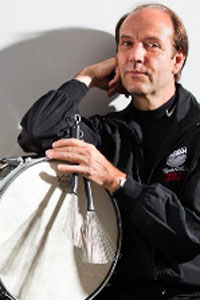Don't see what you're looking for?
Main Site
Berklee.eduCampuses and Schools

Jon Hazilla
For media inquiries, please contact Media Relations
- Recordings for Soul Note, Timeless/Muse, Cadence, Golden Crest, C.I.M.P., Double-Time, and Accurate
- International jazz festivals in Warsaw, Acores, Montreal, Nice, Toulon, and Kyoto
- Recordings as leader on Chicplacity, The Bitten Moon, C.J.Q., Saxabone, Tiny Capers, and You Never Entered My Mind
- Publications include book Mastering the Art of Brushes (Berklee Press) and DVD Brush Control (Hal Leonard)
- Privite lessons with Max Roach, Joe Morello, and John Riley
- American Federation of Teachers Robert Porter Education Award
- Recipient of National Endowment for the Arts Award
- B.M., New England Conservatory of Music
"Playing brushes is a dying art. Brushes are hard to play and even harder to teach, because there's no standard notation; for one thing, a lot of it is visual. The foundation is the patterns to specific tempos: ballad strokes, mid-tempo strokes, up-tempo strokes, and specialty strokes. Students need to be able to play steady time within those tempos before we can talk about soloing."
"I oppose doing the rudiments with brushes because that reinforces stick mentality; a solo with brushes ends up sounding identical to a solo with sticks. And my philosophy—well known within Berklee—is that it shouldn't be that way. My approach is the legato sound: long swooping strokes, leaving the brush on the drum."
"Teaching is very self-renewing, because I'm always getting new students and being exposed to new information. In the first class of every lab I teach, I go around the room and ask students who their favorite drummers or biggest influences are. And usually—probably one per class—there's someone I've never heard of."
"In music therapy class, I also go around the room and ask, 'How did you get into this major?' Almost everyone has a story: a grandmother with Alzheimer's, a baby brother with special needs, and so forth. I can tell you this: almost every music therapy student that I've worked with is driven to help people; they're all very special."
"Eastern philosophy, especially Zen philosophy, affects my teaching approach. I see myself as more than a music teacher. To me, the most exciting part of the job is that I make a real difference in someone's life beyond music. It's important to me that they know, whatever the issue is, they can talk to me about it, and when the door is shut, nothing leaves the room."
"Honesty and integrity are really important to me, and that relates to in-class critiquing. Being honest in a constructive way, I think, would be the greatest thing I would want my students to take away with them, because that transcends music. It's a life quality."
Get More Information
By requesting information from Berklee, you will receive emails about our educational programs, student resources, facilities, and more based on your selections.
Thank you for requesting information.
Check your inbox for an email from Berklee. You will start to receive program information, updates, and deadline reminders.
Find the program that's right for you with Berklee's Find Your Program tool.